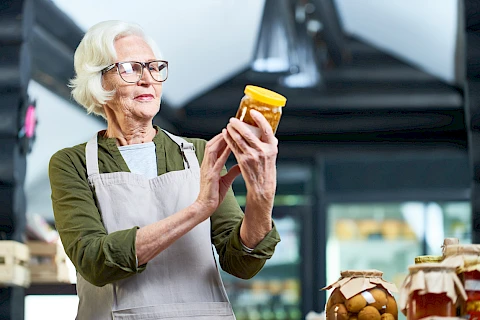
As people age, their immune systems weaken, making them more susceptible to foodborne illnesses. Ensuring the food seniors consume is safe can prevent health issues and promote well-being. Senior Helpers Boston North serves caregivers and seniors, providing dedicated support and guidance in maintaining the highest standards of food safety.
Food Safety for Seniors
Seniors are more vulnerable to foodborne illnesses due to their aging immune systems and potential chronic health conditions. Common food safety risks include improper food storage, inadequate cooking temperatures, and consuming spoiled food.
Proper Food Storage
Storing food correctly is crucial to prevent spoilage and contamination. Here are some guidelines:
- Refrigerate perishable food promptly and keep your fridge at or below 40°F.
- Freeze food at 0°F or lower to maintain its safety.
- Organize your fridge and pantry to allow easy access, and keep raw meats separate from ready-to-eat foods to prevent cross-contamination.
- Label and date stored foods to keep track of their freshness.
Safe Cooking Temperatures
Cooking food to the right temperature kills harmful bacteria. Poultry should be cooked to an internal temperature of 165°F, and ground meats like beef and pork should reach 160°F.
Always use a food thermometer to check temperatures accurately and avoid cross-contamination by using separate cutting boards for raw meats and other foods. Knowing when food has spoiled is essential to prevent foodborne illnesses.
Signs of spoilage include mold or unusual smells in fruits, vegetables, and dairy. Signs could also include a sticky or slimy texture in meats and fish. Bulging cans or packaging can indicate spoilage or contamination. Always dispose of spoiled foods immediately and clean any surfaces they touched.
Safe Grocery Shopping Tips
Selecting and handling groceries safely is the first step in preventing foodborne illnesses. Choose fresh products and avoid those with damaged packaging. Check expiration dates to ensure the products are within their safe consumption period.
Keep raw meats separate from other groceries in your cart and bags, and use insulated bags or coolers for transporting perishables, especially on warm days. If you question whether something is safe to eat, it's probably not.
Meal Preparation for Seniors
Preparing meals for seniors requires attention to safety and nutritional needs. Adapt meals to meet dietary needs and preferences, such as low-sodium or diabetic-friendly options.
Ensure meals are balanced with appropriate portions of protein, vegetables, and grains. Simplify meal prep by cutting ingredients into manageable sizes and using easy-to-handle kitchen tools. Encourage seniors to participate in meal prep to keep them engaged and aware of food safety practices.
Contact Senior Helpers for Compassionate Care and Support
Food safety is a crucial part of caregiving for seniors. Caregivers can significantly reduce the risk of foodborne illnesses by following guidelines for food storage, safe cooking, and meal preparation. Implementing these practices can impact the health and well-being of seniors. For professional caregiving services and more guidance, contact us at Senior Helpers Boston North. We are here to support families in the North Shore, Merrimack Valley, and surrounding areas with expert senior care tailored to your needs.